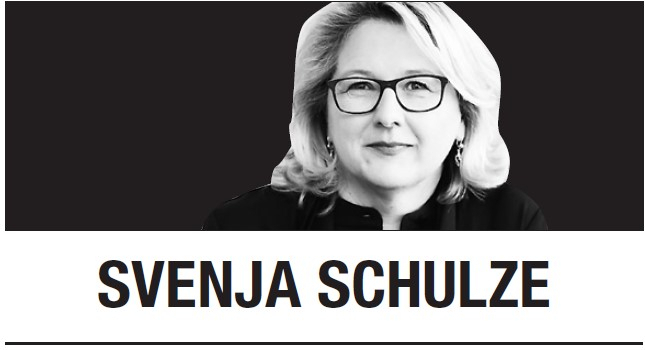[Svenja Schulze, Christina Chilimba] Investing in gender equality
By Korea HeraldPublished : Oct. 10, 2023 - 05:30


Despite coming from vastly different beginnings -- one of us comes from a fishing district in Malawi with one of the country’s highest adolescent pregnancy rates, the other grew up in West Germany during the height of the women’s movement -- we have both seen the transformative impact of empowering women and girls. What also unites us is the same sense of urgency for more to be done -- faster and at a bigger scale.
During the first 20 years of this century, progress toward equality was occurring, albeit not fast enough. But progress has stalled in recent years, owing to the COVID-19 pandemic, the impact of Russia’s war of aggression against Ukraine and inflation.
Now is the time to regain momentum. One way is through “feminist development policy” -- a concept that at its core has a simple idea: Women and girls comprise half the population; they should have an equal share of the power and the same rights, resources and representation as men enjoy.
Progress on gender equality requires the involvement of women and young people in decision-making and the co-creation of policies that are tailored to their needs. These policies give more women and girls access to contraceptives, safe-birth facilities, nutrition packages, immunization and maternal care, regardless of where they live or their socioeconomic status.
The most common-sense and desperately needed policies we are fighting for start with bodily autonomy -- a prerequisite if women and girls are to realize their full potential. When girls graduate from school, the benefits to society are enormous, not least because of the additional brain power and tax revenue. That is why social and cultural barriers that prevent girls from attending school must be removed. In many places, a teenage girl who becomes pregnant is expelled from school and ostracized by her family -- taking away her right to determine her own future. Such outcomes underscore why access to contraceptives is so important.
When a country’s laws and regulations stand in the way of gender equality, it is time to change them. With the support of the World Bank and the Global Financing Facility for Women, Children and Adolescents (GFF), countries are adopting crucial reforms.
For example, in Cameroon, where one in four teenage girls become pregnant, regulatory reforms were introduced last year allowing pregnant girls to remain in school. And in Niger, legislation enacted last year provides married adolescent girls access to family planning services without being accompanied by a parent or husband -- so as not to be unduly influenced in their decision-making. Girls in secondary school can attend clubs to get information about family planning and learn about topics such as respectful relationships and the risks of sexually transmitted infections.
These policies help women and girls make decisions about their own bodies and lives. They are part of the work of the GFF, which uses modest grants to crowd in additional financing from both the public and private sectors, meaning that each dollar invested is multiplied many times over.
A feminist model like the GFF is one of the best investments the world can make in improving gender equality. This is why the government of Germany, alongside the Netherlands, Cote d’Ivoire and the World Bank, are co-hosting a campaign this year to raise at least $800 million for the GFF.
To address not only gender equality but also climate change, racism and other societal challenges, young people need to be involved in the decision-making. Fortunately, today’s youth are politically engaged and eager to make change happen. Around the world, they are forming movements to push for progress and offering fresh ideas and new perspectives on “old problems.” Governments should listen to them.
In Malawi, for example, young people on local health committees are improving health services in their community. They reported shortages of family-planning commodities and electricity blackouts in maternity wards that were literally leaving expectant or new mothers in the dark. Young people are now on national health platforms. As a result, programs that offer free or affordable access to health information and contraception to young people have been created. This is a game changer for young women.
Civil-society organizations are building on new momentum generated by the growing movement of youth engagement that we are witnessing across GFF partner countries from Cote d’Ivoire and Uganda to Madagascar and Mauritania. In Senegal, for example, the Youth Alliance for Reproductive Health and Family Planning created a digital tool that tracks the quality of adolescent sexual and reproductive health services.
We are at a point in history when we have the chance to make a difference for women and girls worldwide. We have an opportunity to fast-track equality. But we cannot do it alone. We invite leaders around the world to support our vision. By investing now and committing greater political and financial support to the feminist development agenda through the GFF, the world can unleash the potential of women and girls to create a more just and prosperous future. It’s up to all of us to make it happen.
Svenja Schulze, Christina Chilimba
Svenja Schulze is the minister for economic cooperation and development of Germany. Christina Chilimba is the founder and executive director of All for Youth in Malawi. -- Ed.
(Project Syndicate)
-
Articles by Korea Herald



















![[Today’s K-pop] Treasure to publish magazine for debut anniversary](http://res.heraldm.com/phpwas/restmb_idxmake.php?idx=642&simg=/content/image/2024/07/26/20240726050551_0.jpg&u=)